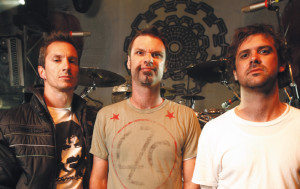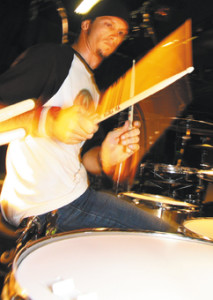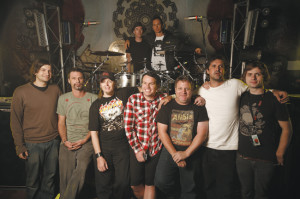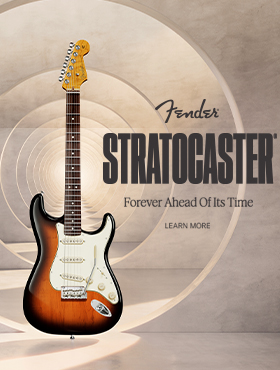COG – SHARING SPACE
June 12, 2008 | Author: Reza Nasseri
 It’s been six years since the emergence of Bondi trio COG’s acclaimed debut EP ‘Just Visiting’ and with ensuing releases, the band has continued to push the envelope with their exploratory heavy rock sound. Try as they may to play down the prog rock tag that has been bestowed upon them, COG’s new album ‘Sharing Space’, featuring epic tracks that run way past the three and a half minute pop sign post and don’t conform to the standard song structure, will do nothing to douse the fire of those who need to pigeonhole bands. Call it what you like, but in reality it’s the sound of a band being brash, brave and ultimately bloody good. Australian Musician’s Reza Nasseri sat down for a chat with Flynn Gower, Luke Gower and Lucius Borich at sound check in the midst of their national Sharing Space tour.
It’s been six years since the emergence of Bondi trio COG’s acclaimed debut EP ‘Just Visiting’ and with ensuing releases, the band has continued to push the envelope with their exploratory heavy rock sound. Try as they may to play down the prog rock tag that has been bestowed upon them, COG’s new album ‘Sharing Space’, featuring epic tracks that run way past the three and a half minute pop sign post and don’t conform to the standard song structure, will do nothing to douse the fire of those who need to pigeonhole bands. Call it what you like, but in reality it’s the sound of a band being brash, brave and ultimately bloody good. Australian Musician’s Reza Nasseri sat down for a chat with Flynn Gower, Luke Gower and Lucius Borich at sound check in the midst of their national Sharing Space tour.
The new album, ‘Sharing Space’ seems to have taken an even more experimental approach to song-writing in terms of arrangements and structure. It seems as though some songs were based around extended jams.
Lucius Borich: I guess in some songs like ‘Problem, Reaction, Solution’ it sounds like it’s more of a jam, but the arrangements were all intentionally structured from jams.
Flynn Gower: We’ve actually listened to a lot of electronic artists as well that veer right away from pop song structure, and we’ve been inspired to emulate that in our own way.
Which electronic artists would you be referring to?
FG: Leftfield, Underworld.
LB: Shpongel, I really like Shpongel.
LG: A lot of dub bands write music in the same way, where one riff repeats through the whole song and evolves into this mantra, and all the layers are based around this. When they reach the end of the song, they peel back the layers and you’re left with that the same riff you started out with.
LB: Layering was a big part of writing this record, we wanted to have a lot of layers in our songs, and as Flynn said that’s what a lot of electronic music does, building songs to a massive crescendo with layering.
Because there are only three of you in the band, how do you go about replicating all these layers when playing live?
LB: We have a Roland unit which has all of our backing tracks on it. All the keyboards, counter-melody guitar parts, vocals, percussion and anything else that we can’t play live is all pre-recorded onto it.
So obviously you’d have to play to a click track in order to make sure all the sequencing is correct?
LB: That’s right. But we map the click track out when we record our songs to make sure the tempos feel right and fluctuate where they need to.
FG: When we finished each mix we sat down and said “How are we going to play this live”, then removed all the parts that we’d play, and were left with the backing tracks.
LB: It’s better than carrying around five other musicians for when we have to play live.
LG: It’s not as expensive (laughs).
Do you feel that having so much sequencing going on takes away from the raw energy of a live performance?
LG: If anything, it adds to the live experience. We physically play as much as we possibly can. If we had another arm we’d be playing a keyboard with it.
 LB: I think we’re all comfortable playing to a click or a metronome, because I’ve practiced playing with them my whole life, in fact we all have. I really love playing to a click because I don’t have to worry whether I’m in time with the other guys. The boys (Flynn and Luke) also use delay pedals, and the delay times are set to the backings so all the repeats are perfectly in time.
LB: I think we’re all comfortable playing to a click or a metronome, because I’ve practiced playing with them my whole life, in fact we all have. I really love playing to a click because I don’t have to worry whether I’m in time with the other guys. The boys (Flynn and Luke) also use delay pedals, and the delay times are set to the backings so all the repeats are perfectly in time.
FG: In the past there have been times where one of us thinks some songs are fast, someone else thinks it’s slow and another person thinks its right on the beat. Having a click track leaves no room for interpretation and acts like an impartial umpire, nullifying any disagreements. I think there is also a relativity issue at stake as well. With the advent of electronic music everything is based around a click, so people have become accustomed to hearing music that is so mathematically correct they associate that with quality. A band that may be a bit loose or are lagging will really stick out these days.
Do you find different audiences vary in their reaction to the music?
LB: Oh yeah, big-time.
LG: It’s amazing how different it is from an overage gig to an all-ages gig, I mean it’s a completely different thing. A lot of kids (at the all-ages shows) are having their first musical experience and don’t quite know how to react.
LB: They’re a bit shy.
LG: Some kids stare at you with their eyes and mouths wide open, some kids are screaming, and others are really getting into it. It’s a far cry from a thousand pissed dudes (laughs).
Drunken, angry young men belching in tune?
LG: I don’t think they’re actually angry. They just look like they are. We hardly ever get any trouble at our gigs and if there is any, it’s sorted out pretty quickly. You’ll see a dude with the heaviest tattoos looking like he just got out of “H-division” coming up to you and saying, “Hey man, can I borrow a dollar, I just wanna go get some scones” (laughs).
The song, ‘Are You Interested?’ seems like it’s analysing the issue of Terrorism. Are there are any fears of tackling such sensitive issues?
LB: No, I don’t have any fears. I think if you can explain it the right way it doesn’t matter what you’re writing about because people are going to interpret it differently anyhow.
FG: That song is more about surveillance than terrorism. It’s more about the collecting of information in a myriad of different ways and what’s done with that information.
LB: You’ll hear the word terrorism, due to the way the media has fed you things, but as Flynn said it’s more about surveillance and the direction the world has taken. The title of the song is called, ‘Are You Interested?’, and I guess what we are trying to paint there is that there is that something of profound significance going on in all our lives, and if you’re interested in what’s going on maybe you’re going to have to read the warning signs and take a closer look at why things are the way they are. We also have ‘Rabbit-Hole News’ on our webpage with a whole heap of links to information that could help educate you as to what’s really going on in the world. It’s our way of saying, have a look at what’s going on instead of maybe watching ‘The Price Is Right’.
What do you want to achieve as band?
FG: We don’t really have a goal except to have a go. We enjoy playing together and think we have a bit of talent.
LG: We want to see how far we can take it.
LB: At any moment it can fall apart so it’s interesting to see how long it will all last.
LG: I would like the opportunity for people around the world to experience what we have to offer as well. It sounds like an easy concept but there are so many logistics involved, with having your CD for sale in other countries and touring overseas.
So what countries have you played in besides Australia?
LB: We’ve played in America, New Zealand and across the water in Tasmania (haha).
LG: I think we’re going to London as well.
LB: We have a release there in January, which is our first in Europe and we’ll be back there hopefully in October.
LG: We’re not saying any more about it, because we might end up touring on the plane (laughs).
Why did you choose to record in the small town of Weed (USA), rather than in Australia?
LG: We put forward other options for producers when it came to recording “Sharing Space”, but were running out of time to find the right one. We also have a great working relationship with Sylvia (Massy), as well as knowing what gear was available to us and how to achieve the results we were after.
FG: The price was also very reasonable for what we wanted to achieve. We had a “Plan B” to record at home in Australia with a reputable producer, and the costs were pretty much the same. Her reputation as probably the most successful female rock producer working with bands like Tool, System of a Down and The Red Hot Chili Peppers ended up making her the obvious choice.
Are there any tricks you employ to make your guitar sound as big as possible to compensate for not having another guitarist?
FG: When we play live I use three different guitar cabinets across the front of the stage, and there is another one coming so I’m going to use four all up, to give a slightly different tone and create a monstrous wall of sound.
What amp do you use?
FG: I use a 4 channel Mesa Boogie Roadster. I use one when playing and have a spare as a backup.
When it comes to monitoring do you prefer “in-ears” as opposed to traditional fold-backs?
FG: For Luke and I this is our first gig with “in-ears”, but Lucius has been using them for years, because we didn’t want to risk the click bleeding out into the rest of the mix.
What’s the difference between using “in-ears” and fold-backs?
LB: You get used to using “in-ears” and you don’t wanna go back. There used to be a lot of harsh frequencies floating around the stage, whereas now, that’s not an issue. Over the years I have actually been turning down my monitors as well, where things still sound as loud but with better definition and clarity. In general I find you can hear things better and play tighter. There is also no delay when I’m hearing Flynn’s voice, as his voice is literally right in my head.
FG: Lucius used to use a little Behringer 8 channel mixer, but now we’ve upgraded to a Roland V-Mixer (digital console) and we each have our own page in terms of mixes, where we can customise an individual mix for each of us.
So you don’t require a monitor engineer any more?
FG: We’re using one tonight, because the V-mixer is still new to us, but in the future we may not require one at all
LB: After we’ve sound-checked, our mixes are completely automated and tailored specifically to our songs with effects, volume changes and planning completely mapped.
LG: You can even record the whole show by plugging a USB stick into the desk, which will open a new door for us when it comes to recording demos because we’ll be able to record every jam.
So obviously technology plays a big role in Cog’s music?
FG: It does the more we get into it. It seems like the cases are growing every week. Last year we were carting around 30 cases, now it’s at around 50, it wouldn’t surprise me if we hit a hundred in the next couple of years.
LG: But that’s nothing compared to some of the big name professional touring acts out there.
Do you ever want to strip the music right back and go back to playing pub gigs?
LG: Not really (laughs).
LB: When we played our first shows in the US that was pretty stripped back. We had 4 channels working out of an 8 channel desk. We each had a vocal mic and I had a kick mic as well, that was it!
FG: We’ve been there and done that, so now we want to see what it’s like using an absolute shit-load of gear (laughs).
LG: I’d like to go back to some of those venues where we started out that gave us a go when no one else would. Sometimes you forget what it used to be like after experiencing success. There was a guy at a venue in Bexley that used to let us play before we were even singing, and even he’d come out and help us load in as well.
What’s with the twin mic setup you use for lead vocals?
FG: One is used as a normal vocal mic and the other is set up to sound like a telephone effect. So rather than the front of house mixer having to switch the effect on and off, I can choose when I want to incorporate that sound to create some contrast in the vocals. We used to use an old busted (Shure SM) ’57 which had pinholes in the diaphragm, which naturally sounded like that, but we lost that mic.
LB: We’re afraid to do that to a new ’57 in case we ruined it (laughs).
The song “Bird of a Feather” seems to look at the struggle between having a family and having a career. Why is it so hard to have both?
FG: The issue is not so much about one or the other as it’s about where to devote your time. So many people these days are focussed solely on their careers and chasing a financial dream, that their relationships with their families suffers at the end of the day. Ultimately the most meaningful stuff gets marginalised and left behind and we’re in a position where all of those issues are amplified and juxtaposed.
LB: It was definitely the right time for us to sing a song like that. A lot changed in our lives when recording “Sharing Space”, so that issue needed to be explored on “Bird of a Feather” and “Say Your Last Goodbye”.
At what point did Cog become a full-time career for you guys?
LB: When we were in a financial position to give up our day jobs.
FG: It happened around three years ago for Luke and Lucius, and four years ago for me. Even then, it was a gradual transition where we’d cut down a bit or work and work three or four days to focus more on being musicians. I remember reaching a point where it was just too much and I couldn’t go on juggling both.
LG: For me it was when I woke up and realised I never have to lay another brick ever again. I remember my alarm going off one morning at 6 am and I just laughed (laughs). That day I just went for a surf and hit the pub.
What do you think of Australia’s heavy music scene?
LG: I feel like there is a bit of a movement going on right now. It’s almost like we were friends with some of those bands before we’d even met. It’s like we were bubbling over here and Karnivool were bubbling over there, “Butters” (The Butterfly Effect) were taking off up in Queensland. We’ve played shows with all those bands and call each other up and see how we’re going even when we’re not playing.
LB: The camaraderie is awesome. It’s like we are all one big band. If one of us gets a win, it feels like a victory for all of us, and you thank god some great Australian music is getting a real go.
 FG: There are more and more bands in the same genre making headway like Dead Letter Circus, Mammoth, Sleep Parade and this continues to mock how the mainstream media treats heavy music in this country.
FG: There are more and more bands in the same genre making headway like Dead Letter Circus, Mammoth, Sleep Parade and this continues to mock how the mainstream media treats heavy music in this country.
‘Sharing Space’ is out now. Visit www.cog.com.au for more information


